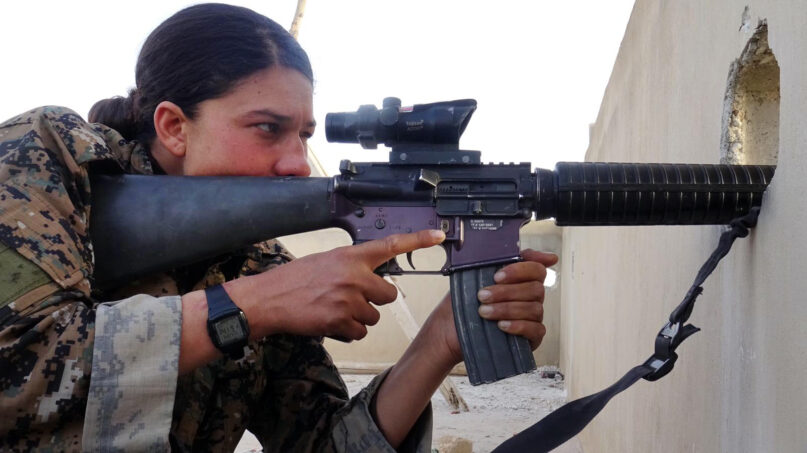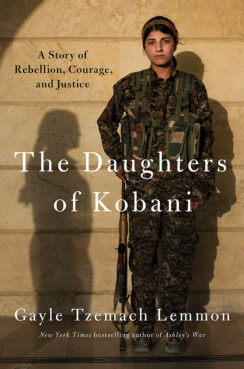(RNS) — The Syrian border town of Kobani was little known outside the region until 2014. That year the dramatic stand of the Kurdish separatists against an Islamic State group offensive received global attention. During six months of urban combat, an outnumbered but determined Kurdish force backed by U.S. airpower handed IS, also known as Daesh, its first strategic setback.
The role of women in that and other struggles in the Syrian Civil War is the focus of “The Daughters of Kobani: A Story of Rebellion, Courage, and Justice” by Gayle Tzemach Lemmon. The book, published Tuesday (Feb. 16) by Penguin Press, focuses on the role of all-women combat units and female combat commanders in that struggle. Lemmon has worked as a war correspondent, among other roles, with a special focus on women’s issues throughout her career. She has written previous books on Afghanistan and women in the U.S. military.
Lemmon made seven trips to Syria and Iraq from 2017 to 2019 and did hundreds of hours of interviews for the book with various units of the Syrian Democratic Forces (SDF), as well as U.S. military personnel working in support of the Women’s Defense Units (YPJ). Among all-female YPJ units, the struggle for religious pluralism was just as important as the rights of women or the struggle for autonomy.
RELATED: Christian aid groups vow to stay to help after US sudden withdrawal from Syria
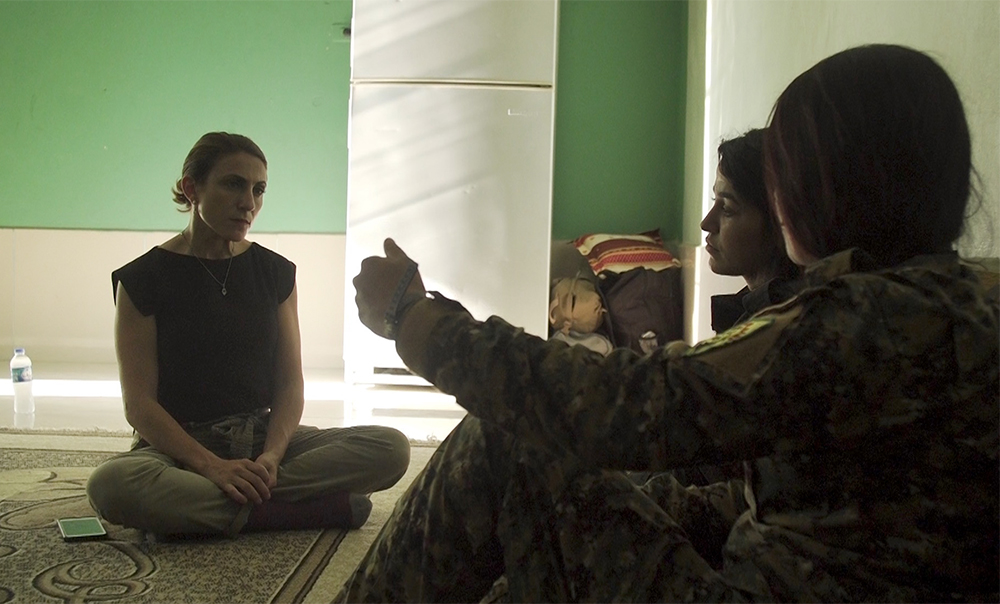
Author Gayle Tzemach Lemmon, left, interviews a group of women fighters during the fight for Raqqa in the summer of 2017. Photo courtesy of “The Daughters of Kobani”
“The women I met with and spoke to were focused and motivated by their role in women’s emancipation and the struggle against ISIS,” Lemmon told RNS. “The YPJ was multi-religious, was deeply motivated for a number of reasons to fight against a group that bought and sold women.”
Before the start of the Syrian Civil War in 2011, the country’s Kurdish population numbered some 1.7 million, making them roughly 5% to 10% of the overall population. The majority of Syrian Kurds practice Sunni Islam, but there are smaller minorities of Christians, Shia Muslims and Yazidis as well. Of this latter group, studies suggest an estimated 7,000 were enslaved by Daesh at the height of its power.
The YPJ was formed as an armed wing of the Democratic Union Party (PYD), which was itself formed as the Syrian wing of the Kurdish Workers Party (PKK). Under U.S. tutelage, the YPJ was merged into the U.S.-backed Syrian Democratic Forces (SDF) in 2015. The book follows a handful of women involved with the YPJ throughout their campaign. The book places a strong emphasis on the battles of the YPJ but also on the cultural context and details of the soldiers’ personal lives.
Women joined the YPJ for a number of reasons, including its success on the battlefield, the treatment of women at the hands of the Islamic State group and a variety of other factors. Eventually, members of other groups, including Arab women, joined the primarily Kurdish force.
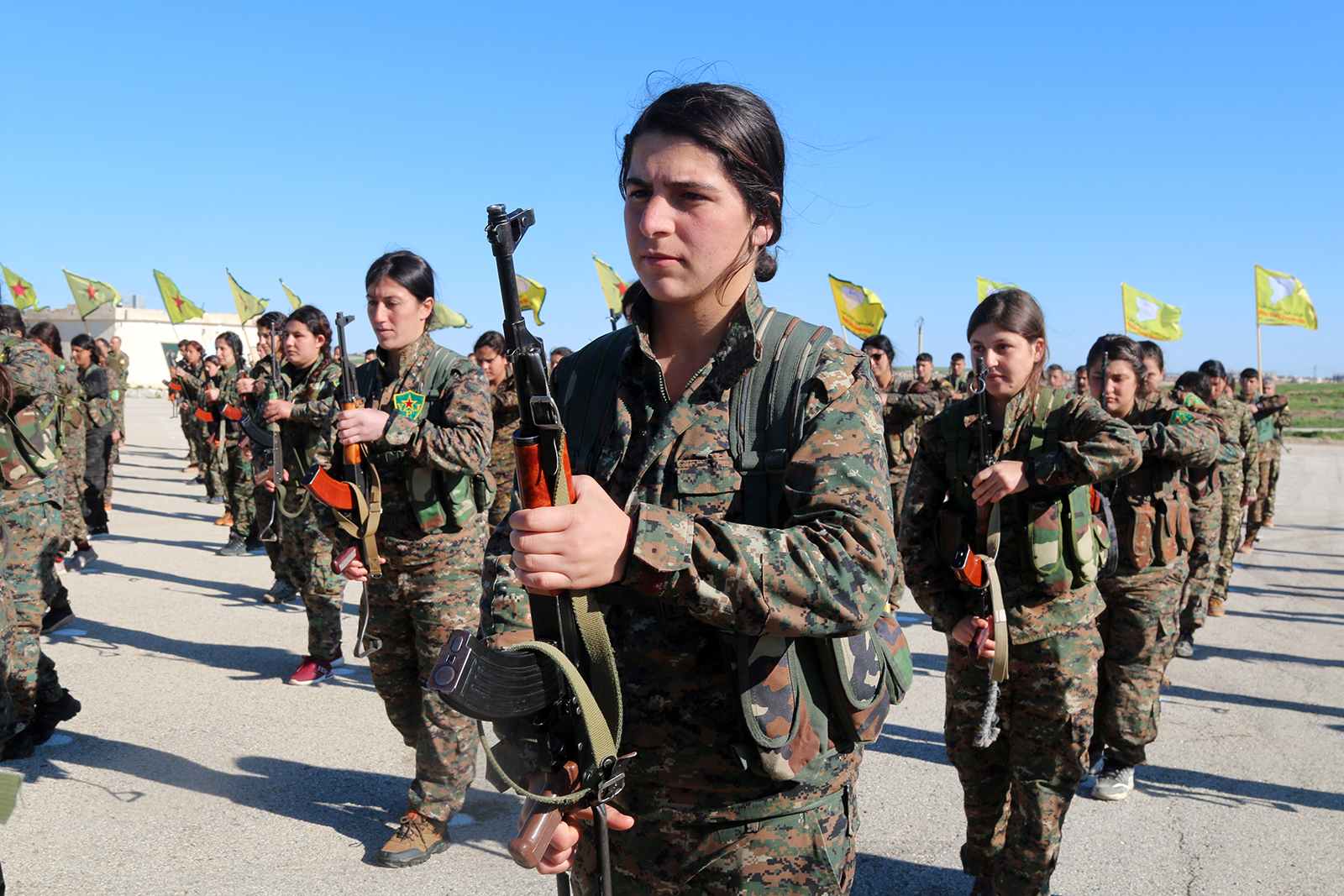
All-female militia fighting against the Islamic State stand in formation. Photo courtesy of “The Daughters of Kobani”
RELATED: For Iraqi priest, pope’s visit raises hope of restored trust between Christians and Muslims
“There were Muslim women within the SDF who I saw who very much practiced their faith … and there were young Christian women who joined, and often the (family) dynamics were very similar. The parents of these Christian women were often opposed to them joining the (SDF), but, when they saw Christians kidnapped and other atrocities, these same parents earned a respect for what their daughters were doing,” Lemmon said.
The rights to develop the book into a television series have already been purchased by HiddenLight Productions, owned in part by former U.S. Secretary of State Hillary Clinton and her daughter Chelsea. The involvement of the Clintons in developing the story into a miniseries has been criticized in some circles for rewriting history and limiting the role of Kurds in telling their own story.
“My responsibility is to the people who trust me with their story, and I look for a partner who cares deeply about the subject matter in all its complexity and is true to all people who risked their lives and will get it all across the finish line,” Lemmon said when asked about the Clintons’ involvement.
- Author Gayle Tzemach Lemmon. Photo © Frankie Batista
- “The Daughters of Kobani: A Story of Rebellion, Courage, and Justice” by Gayle Tzemach Lemmon. Courtesy image
U.S. efforts to aid the YPJ were complicated by its ties to the Kurdish Workers’ Party or “PKK,” which has been designated a terrorist organization by the U.S. government. The YPJ was described by the U.S. Director of National Intelligence in 2018 as the Syrian wing of the PKK. Throughout the book, the U.S. advisers are portrayed as trying to walk a political tightrope by providing aid to the YPJ in its struggle against Daesh but not in its larger struggle for autonomy. The YPJ, which was founded in 2013, was modeled on similar women’s units launched by the PKK in 2004. The YPJ itself is not without controversy and has been criticized by human rights groups for its use of child soldiers.
PKK leader Abdullah Öcalan was captured in 1999 by Turkish intelligence officers, reportedly with the assistance of the Clinton administration. The use of banners with Öcalan’s image in Raqqa after the city’s capture drew condemnation from the U.S. government. The book zooms in on the role of YPJ units in this battle — in which IS fighters made a determined stand at Raqqa, motivated by the belief the site would play a role in the end times.
In the book, Lemmon wrote of the opening of a women’s council after Raqqa’s liberation — on the same street where, 10 months earlier, women had been bought and sold as slaves. She described one of the women in attendance at the opening as wearing the same “I Really Don’t Care, Do U?” Zara jacket, which sparked controversy when it was worn by former first lady Melania Trump. Another young woman survived the IS occupation of her community by reading the works of Egyptian author Naguib Mahfouz, who was an early critic of terrorism and extremism in the region. Indeed, while the book does not shy away from discussing the slavery, rape and other abuses women faced at the hands of IS, the overwhelming message of the book is one of hope.
“This was a movement with religious freedom and multiethnic governance with women at the center” said Lemmon. “That is why they were fighting house by house, street by street to stop ISIS in Kobani and elsewhere. The women I interviewed said it was not just for their own sake, for their own freedom from oppression, but for the world.”
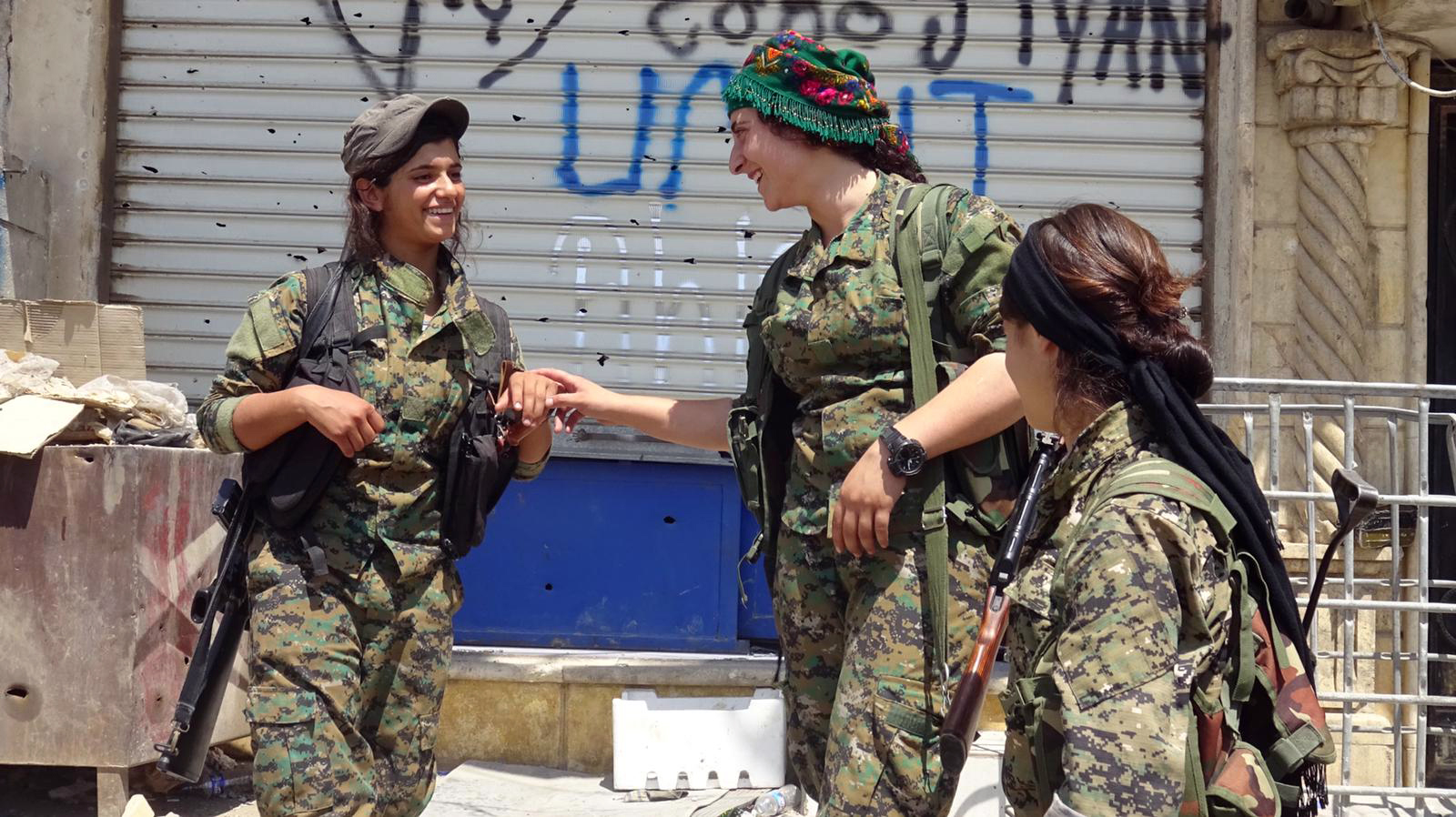
A group of fighters, part of an all-female Kurdish militia, share a laugh. Photo courtesy of “The Daughters of Kobani”
